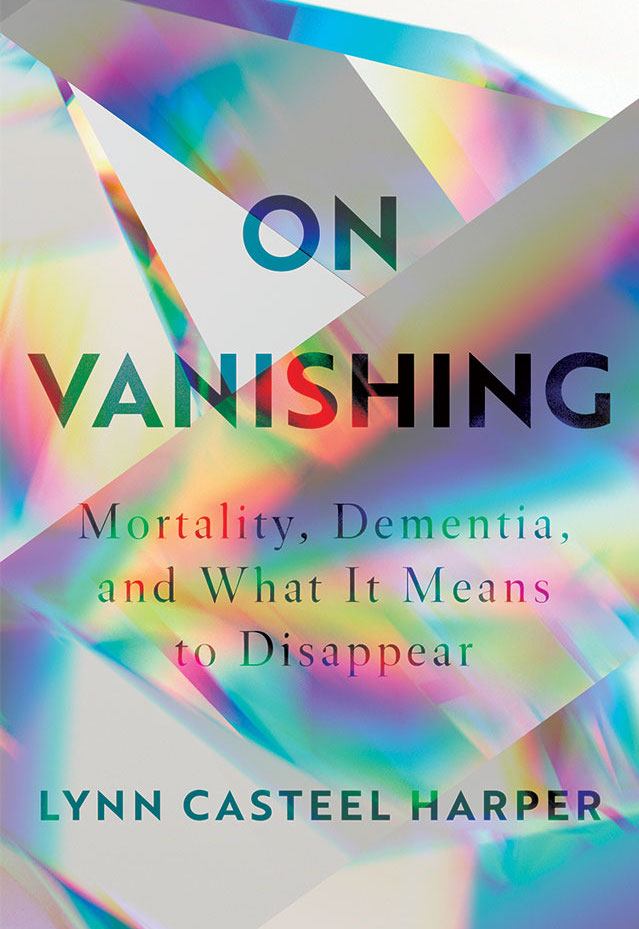On Vanishing: Mortality, Dementia, and What It Means to Disappear, by Rev. Lynn Casteel Harper

In the midst of a pandemic, with ever-present news of sickness and death, I wasn’t sure I wanted to read a book about dementia. But because On Vanishing is by Rev. Lynn Casteel Harper, my friend and colleague in Equity for Women in the Church, whom I know also as a fine writer, I decided to take the plunge. I was delighted to find this book compelling and lyrical, rich in metaphor and mysticism, filled with hope and beauty.
The book’s title didn’t at first draw me, because I identify with the prevalent fear she writes about, the fear of vanishing, of disappearing, through loss of memory and finally through death. But early in the book she reframes “vanishing” with a vivid metaphor: “If I stand still and watch a person walk away from me, she grows smaller and smaller, until she reaches the vanishing point. She has not vanished from the planet or from herself—she has vanished only from my view.” “Vanishing,” Harper continues, is only “an illusion.” So, persons with dementia may appear to us to be “vanishing,” but only because of our “limited powers of vision.” In the last chapter she expresses her desire “to embrace the tension between presence and absence as residing at the heart of [her] faith.”
In our time, people may fear Alzheimer’s more than many other diseases, Harper notes. “Rather than the fear of invasion or contagion, it evokes the fear of advancing oblivion.” They may try to stave it off by taking Ginkgo Biloba and/or doing crossword puzzles. My mother took Ginkgo for many years and so did I, until we learned about some harmful side effects. She lived to be 98, grateful she never had dementia. My father, who died at age 54 from cancer that spread through most of his body, expressed gratitude that he never “lost his mind.”
Harper points out that the language we use to describe persons with Alzheimer’s, metaphors such as “the living dead,” “shells,” “gone,” increases suffering: “I worry that the language we think describes a reality also creates one, that Alzheimer’s notorious reputation adds to the suffering of those who have it, their caregivers, and everyone else in the at-risk population—that is, all of us who plan to grow old.” I resonate with what she writes about the power of language to create reality, because I’ve written about the harm that comes from exclusively male naming of the Divine that forms the foundation for patriarchal religion.
Dualistic language that “separates the mind from the body, the self from the flesh,” Harper asserts, results in gender and racial injustice along with injustice to persons with dementia. Western tradition “associates the male with the mind, and the female with the flesh.” Bodies, like women, are treated as subordinate and morally inferior. When dementia reveals the inseparability of the mind from the rest of mutable flesh, it also exposes the reality that the male is inextricably connected to the female. “By patriarchal logic,” this is “a terrible demotion: the pollution and denigration of the mind. The assumption that men—namely, white men—are closely aligned with reason and rationality, the supposed ‘higher’ forms of being, relegates women, men of color, and nonbinary people to the ‘lower’ realms of the flesh.”
From her Christian faith tradition, Harper brings a hopeful corrective to harmful dualities. Although she acknowledges that her tradition “has often perpetuated a damaging mind/body duality,” she finds hope in early teachings on the resurrection, “in which transcendence comes through the body, not apart from or despite it.” This is indeed good news for persons with dementia, too often judged as deficient not only in mind, but also in soul and spirit. “No longer does a blemished brain indicate a defective self that gradually and hopelessly vacates its body. The brain, in all its vagaries, remains part of the body, which is no less a temple, no less the source of hope and resurrection because of its wounds . . . . Shattering notions of self-containment, of narrow definitions of knowing, dementia refuses the abstraction of straight lines, including any neat border between flesh and spirit, body and mind. The circle of what it means to know and be known widens, rushing outward to new and larger circles.”
In addition to her powerful alternative to sexist and ableist dualistic language, Harper critiques light/dark dualisms that support racism as well as discrimination against persons with dementia. Traditional metaphors, like “succumb to the darkness,” reinforce dread of dementia. They are based on connotations of “light” as good and “darkness” as bad. This bias against darkness “splits the world into stark hierarchies in which dark and light exist not as two distinctive yet interdependent elements—each equally needing the other—but as disparate, opposing forces.” She connects injustice suffered by people with dementia to racial injustice, stating that light/dark hierarchy “both reflects and generates injustice (the history of racism bears this out in horrifying specificity.)” She notes another intersection of injustices related to race and dementia: racism and poverty contribute to the high rate of Alzheimer’s among African Americans, about twice the rate of the disease among whites.
Harper’s reclaiming of positive darkness metaphors resonates with me, because I’ve also tried to counter racism by reclaiming positive images of darkness in my writing. She draws from Christian mystical traditions to celebrate darkness as “integral to the soul’s journey,” as preparation for a “divine encounter.” For St. John of the Cross, the “dark night of the soul” is a necessary passage to “the inestimable delights of the love of God” and the “inflowing of God into the soul.” Trappist monk Thomas Merton experiences the night as liberating, as opening “infinite distances to charity” and sending “our souls to play beyond the stars.”
Harper believes in the power of stories to dispel myths about persons with dementia, and she’s a gifted storyteller. The stories in On Vanishing show not only her compassion but also her deep respect for them as persons. Drawing from personal experiences and her ministry as a nursing home chaplain, she weaves moving stories throughout the book. She writes about her grandfather Jack, a medical doctor, who suffered painful losses as his dementia progresses. Not denying the grief she and her family felt, she writes about experiencing “a new tenderness in him” a “stillness” that “eclipsed his earlier frenetic disposition.” Unflinching in writing about her own high genetic risk of Alzheimer’s, she titles a chapter “When [not If] I Have Dementia.” She honestly confronts her fears, but finds hope and comfort in Jesus’ parable comparing God to a woman who lost a coin. She hopes that when she has dementia, others will search for “missing” parts of herself, as the woman diligently searches until she finds the lost coin. “I will play the searching woman while I can,” Harper writes. She does just that in her chaplaincy ministry with Evelyn. She “recognized something deeper” than confusion in Evelyn’s “yearning” to go outside the nursing home to meet her long-deceased mother whom she thought was waiting.
Illustrations from art and literature also enhance On Vanishing. Harper begins and ends the book with musings on life’s transience as she studies Jacques de Gheyn’s Vanitas Still Life painting in the Metropolitan Museum of Art. She holds up the Fool in Shakespeare’s King Lear as an example of loyalty and humility in relating to persons like Lear who confesses, “I fear I am not in my perfect mind.” Ralph Waldo Emerson, during his last decade with progressive memory loss, experienced deep joy in the simple pleasures of each moment. She comments that “his life with dementia, it seems, was marked by the pure presence” he described in his essay “Self-Reliance.” From Susan Sontag’s classic Illness as Metaphor Harper draws wisdom for changing our language to describe dementia.
I highly recommend On Vanishing, a book for everyone, wherever we are on our body/mind/spirit journey. Written in an engaging style, this book invites us to expand our spiritual experience and inspires us to move beyond society’s biases to deeper understanding of personhood. On Vanishing is a unique, poetic, and profound book on what it means to be mortal human beings.

Rev. Lynn Casteel Harper is a writer, minister, and chaplain. An ordained Baptist minister, she currently serves as the Minister of Older Adults at The Riverside Church in New York City and on the board of Equity for Women in the Church. She is the author of On Vanishing (Catapult, April 2020), a nonfiction book that explores the dimensions of spirituality, social justice, and dementia. Lynn received a Barbara Deming Fund grant for women writers for the project. Her work has appeared in Kenyon Review Online, Catapult, The Huffington Post, North American Review, CALYX, the Journal of Religion and Abuse, and elsewhere. She received the New Delta Review Nonfiction Prize in 2013 and the Orison Anthology’s 2017 Nonfiction Award. She was named runner up for the Torch Prize in 2016. Lynn completed her M.Div. at Wake Forest University and her chaplaincy residency at Robert Wood Johnson University Hospital in New Brunswick, NJ. Lynn served as the nursing home chaplain at a continuing care retirement community on the New Jersey shore for seven years. Originally from southeast Missouri, Lynn lives in New York City with her spouse Ryan Harper. She can be reached through her website.